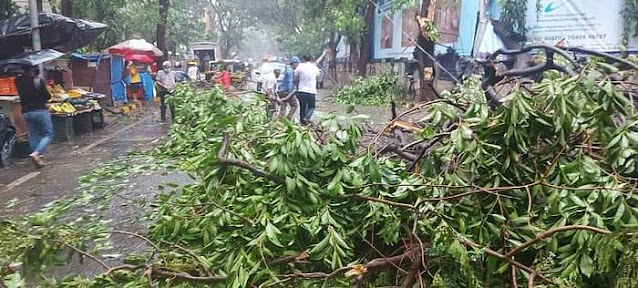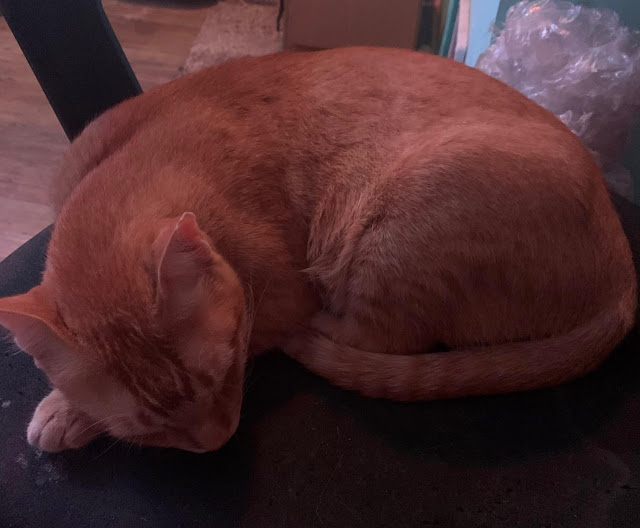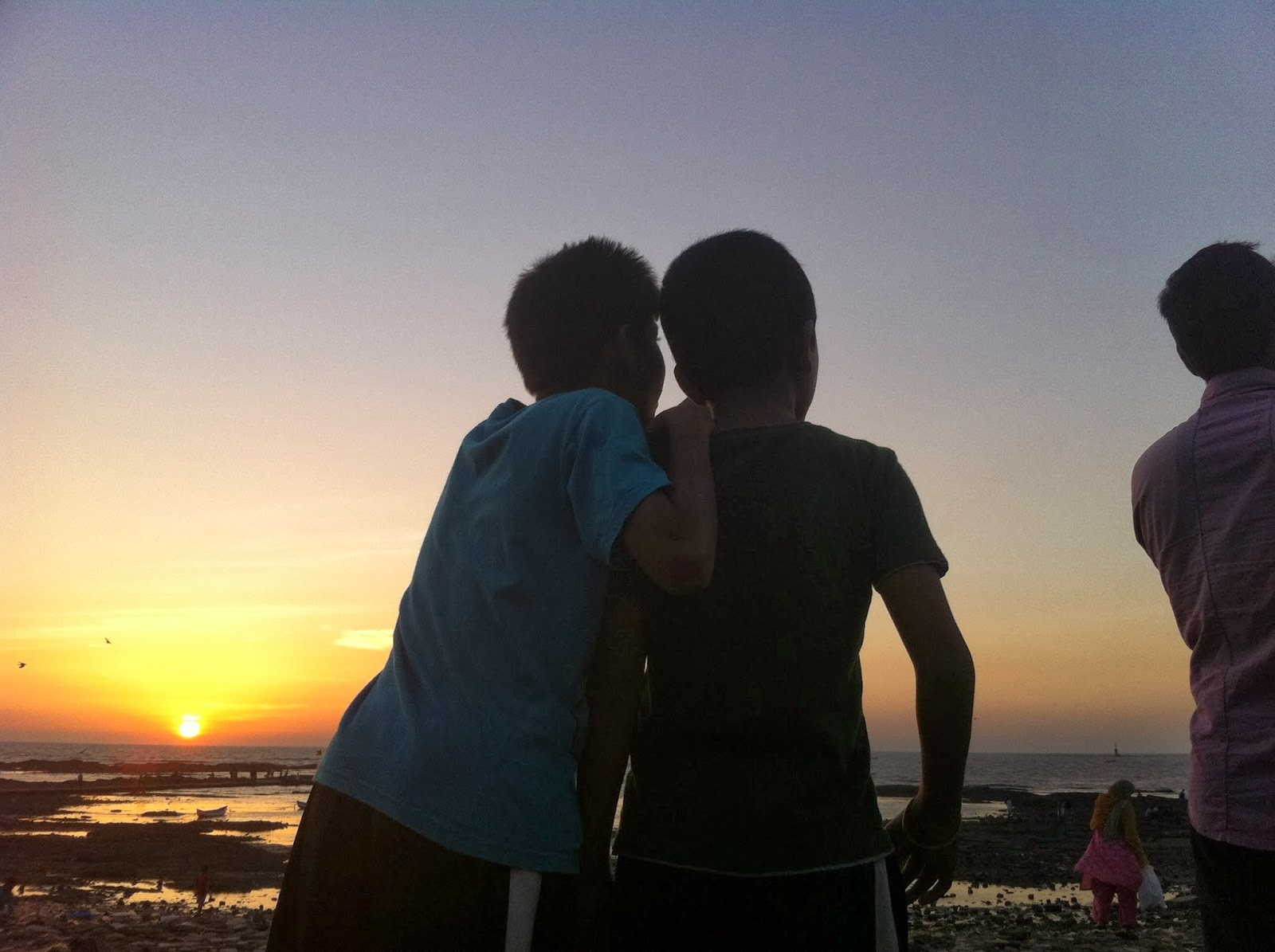I live in a rooftop apartment, so every year before the monsoons, my roof needs some work done. Mostly they patch the holes and try to waterproof the whole thing. This year, the work was about to begin two days ago when Cyclone Tauktae became the strongest storm to hit the west coast of India in 20 years. Water dripped in from the ceiling and flowed freely in from an electrical conduit. I put a bucket under the big leak and had to empty it every 20 minutes during the worst of it. There were 4 other buckets strategically placed around the room, and the entire wooden floor was covered with towels that were soaked. Winds gusted to 100 mph (160 kph). The cat and I cuddled closely all night.
 |
| The Sea Was Angry That Day, My Friends |
I took a walk the next day. Most people stayed inside, but I grew up in Miami, and I knew that the day after a hurricane is beautiful. The weather was cooler and cloudy. There were palm fronds on the ground everywhere; blocking streets, in apartment compounds, outside shopping malls. There were even a few large trees on the ground. I stopped to chat with fruit vendors, the shopkeepers, and my fellow pedestrian. Kal pagal tha, na? Bahut pani tha! We nodded knowingly at one another.
 |
| The Streets of Mumbai the Day After the Cyclone |
Today, the work on the roof began in earnest. There were three of them up there, right above me. My ceiling is made of a sheet of drywall, and above it is supposed to be a roof made of concrete panels. But it was a mess up there, with corrugated iron roofing mixed among the concrete, and many holes and cracks. Unbeknownst to me, they decided to remove the entire roof and replace it. As the day wore on, sunlight began to angle into my room from spots where my ceiling had holes and the roof above was dismantled. I began to realise there was nothing above my ceiling except structural 2x4s. There was noise all day, of course, loud, sudden, noise, of heavy objects being dropped above me. The punctuated sound of dust and wood planks and tools and roofing materials landing above me, echoing around the room. William T. Cat was quite perplexed, and spent a lot of time staring at the spots above where the noise was coming from.
And then it happened. An ordinary moment, at my desk, with my laptop, and then suddenly there was a crashing noise and dust all around, and a chunk of drywall about the size of an extra-large pizza came crashing upon my poor unsuspecting skull. I was suddenly hit by the light, and for a moment I think I wondered if it might be transcendental. Then I realised it was a beam of sunlight. There was nothing between me and God’s blue sky. Meanwhile, I had no idea what had happened to my head. The chunk of concrete landed right on top, cutting my forehead and depositing dust all in my hair. I sat motionless for a few moments, then I think I uttered a few choice expressions of displeasure, including What the fuck was that? And The fucking roof fell on my head!
 |
| the hole in my ceiling, now covered with wood |
What had happened was that one of the workers tripped over an internet cable and fell. He used his hand to brace his fall and landed on the drywall instead of one of the two by fours. His hand went right through my ceiling, right above my head. After the collapse, he stuck his head in the hole to see if I was alright. I was not. I was freaked out, and a little bit in shock. And there was a drop of blood wending its way down my forehead. Billy the cat freaked out and ran into the bedroom to hide in the almirah. I stood up, a little dizzy. I went downstairs to tell the landlord, who lives below me, what happened. They saw the cut on my forehead and ran to get turmeric to put on the wound. I sat on the stairs because it suddenly became difficult to stand. It was more the adrenaline than the head wound, I thought. I was pretty sure. The landlord’s family offered to take me to a doctor. I refused at first, went upstairs, and took a shower. I’m skipping the part before the shower where I couldn’t find Billy T. Cat and I started to lose my mind thinking he ran away downstairs to get away from the craziness up here. I definitely panicked and it wasn’t fun.
Fortunately, Billy was just hiding amongst my clothes. Poor baby was scared out of his mind. He didn’t come out for 4 hours. After I cleaned myself up, I felt a little better, but I still had a headache. I felt a little traumatised, both physically and emotionally. Really, I can be so sensitive about these things and they wipe me out. I actually think I inherited some trauma, or rather a reduced ability to deal with it, from my father, who was a holocaust survivor. One theory talks about epigenetic inheritance, or the idea that trauma can affect one’s DNA, and those changes can be passed on to future offspring. More likely is simply the emotional effect that persists in the parent and is subconsciously passed on to the offspring. In any case, I can be cripplingly sensitive to traumatic events. In this case, I was exhausted and light-headed, and starting to feel a little sad. Just to be safe, I took my landlord’s family’s offer of taking me to a doctor. I got on the back of a motorcycle and rode winding roads through the hills of Pali to a small doctor’s office. Every doctor older than 50 reminds me of my father, and this one was no exception. He had me lie down, examined my neck, looked at my head, and proclaimed me generally fit. He wanted to give me a tetanus shot, which I allowed, and antibiotic pills, which i refused. I’ll keep the wound clean and use topical antibiotics. I don’t want to tweak my whole system with antibiotics if not completely necessary.
 |
| 'tis but a flesh wound |
I made it back home, finally coaxed Billy out of the closet, and now I am taking rest, as they say. Billy is sleeping next to me. The hole in my ceiling has been covered by a sheet of wood, and the workers are coming back tomorrow to replace the roof and then waterproof it for the season. I’m not exactly sure how they’re going to handle the hole in my ceiling. They apologised profusely. I forgave them. And I’m grateful to my landlord who really does treat me like family. Pretty close, anyway. I’m having Moti, our houseboy, check in on me every couple of hours, just to make sure I’m ok. I’m a little afraid to go to sleep tonight, but that’s probably an overreaction. I’m sure I’ll be fine.
 |
| poor baby, finally asleep after a scary day |









































